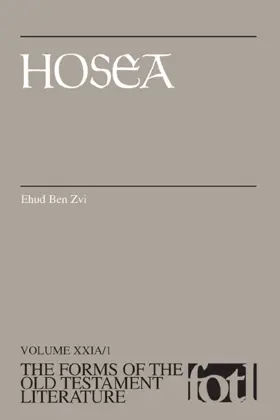

Hosea
in Forms of the Old Testament Literature
Pages
336 pages
Publisher
Eerdmans
Published
11/1/2005
ISBN-13
9780802807953
Hosea by Ehud Ben Zvi is Volume XXIA/1of The Forms of the Old Testament Literature, a series that aims to present a form-critical analysis of every book and each unit in the Hebrew Bible. Fundamentally exegetical, the FOTL volumes examine the structure, genre, setting, and intention of the biblical literature in question. They also study the history behind the form-critical discussion of the material, attempt to bring consistency to the terminology for the genres and formulas of the biblical literature, and expose the exegetical process so as to enable students and pastors to engage in their own analysis and interpretation of the Old Testament texts.
His second work for the FOTL series, Ehud Ben Zvi’s Hosea features a comprehensive introduction and careful commentary with special attention to themes of exile and restoration, as well as extended discussion of didactic prophetic readings. An excellent form-critical interpretation of the book of Hosea, this volume will be a valuable aid to scholars, students, and teachers.
Collections
This book appears in the following featured collections.
- Commentaries by Jewish Scholars by Matt Quintana
Reviews
Ehud Ben Zvi's FOTL isn't a commentary, but people often include this form-critical series in commentary reviews. Ben Zvi discusses section of the text under the headings of structure, genre, setting, and intention. His concern for theology is a boon, but some reviewers think he somewhat ignores social implications. He separates the setting of the book (the time of Hosea, with Hosea the prophet as a mere character in a story) from the audience of the book (only the literary elite of postexilic Judaism, since those who cannot read must also be unable to hear when something is read to them). He uses postmodernist reader-response language when it suits him to allow for tentative judgments on matters he is less sure of but then ignores it and dismisses outright any interpretation that takes the prophecy to have been written around the time Hosea actually lived. He also tends to use theological intentions in opposition to historical issues, which leads him to ignore the Canaanite ritual background of Hosea's time. I can't recommend this to those who just want to study Hosea, but it's an important scholarly work that students and scholars should engage with.
[Full Review]
Ehud Ben Zvi is no stranger to those who read and study prophetic texts. In addition to his monographs and commentaries on individual prophets, he has published numerous articles and essays on prophetic interpretation. His recent work is a welcome addition to Hosea studies. The volume begins with a brief editorial forward explaining the purpose of the series. Unlike the older form-critical method that focuses on the oral prophetic word behind the text, the Forms of Old Testament Literature series limits its investigation to the literary forms of final written texts. The book begins with a brief introduction to the book of Hosea as a whole (ch. 1). The bulk of the book is chapter 2 (23–317!), which features a section-by-section analysis of every unit (or “Prophetic Reading”) in Hosea. Because there are no subsection listings in the table of contents (or section headers at the top of the page), the reader must thumb through these nearly three hundred pages to locate a specific passage. The book concludes with a three-and-a-half page glossary of the genre terms employed in the book. I found it helpful to read this brief glossary before reading the body of the book. Like the other volumes in this series, there are no indices of passages, subjects, or authors. The plan is to print a single index volume when the series is complete (xii).
[Full Review]

